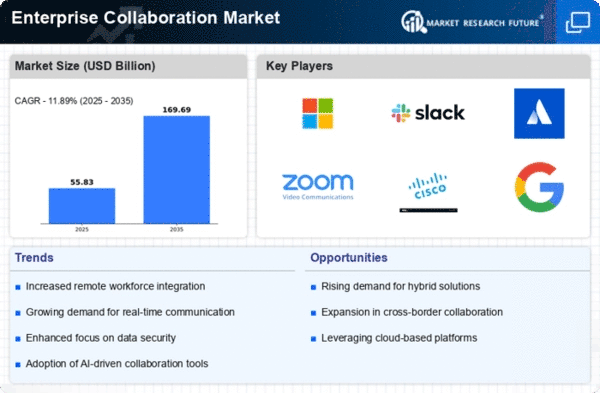Top Industry Leaders in the Enterprise Collaboration Market

The Enterprise Collaboration Market: A Competitive Landscape in Flux
The enterprise collaboration market is a dynamic and rapidly evolving space, driven by the ever-increasing demand for seamless communication, knowledge sharing, and project management across geographically dispersed teams. The competition is fierce, with established players vying for market share alongside nimble startups offering innovative solutions.
Key Players and Their Strategies:
-
Adobe Inc.
-
Cisco Systems, Inc.
-
Atlassian Corporation Plc.
-
Facebook, Inc.
-
Google LLC
-
IBM Corporation
-
Microsoft Corporation
-
Igloo Software
-
Jive Software
-
Mitel Networks Corporation
-
Salesforce.com, Inc.
-
SAP SE
-
Slack Technologies
-
TIBCO Software Inc.
-
VMware, Inc.
Factors Influencing Market Share Analysis:
-
Solution Breadth and Depth: Offering a comprehensive suite of tools covering communication, file sharing, project management, and document collaboration holds significant weight.
-
Security and Compliance: Strict data privacy regulations and sensitive information handling necessitate robust security features and compliance certifications.
-
Integration and Interoperability: Seamless integration with existing workflows and other business applications is crucial for user adoption.
-
Cloud-Based Delivery: Cloud-based solutions offer scalability, accessibility, and lower maintenance costs, making them the preferred choice.
-
Mobile Accessibility: Mobile-friendly interfaces and functionalities are essential for on-the-go collaboration.
-
Pricing and Value Proposition: Competitive pricing models and clear value propositions tailored to specific industry needs are key to attracting and retaining customers.
New and Emerging Companies:
-
AI-Powered Collaboration: Companies like Hypercontext and WorkGenius are leveraging AI to automate tasks, personalize communication, and provide real-time insights into team dynamics.
-
Virtual Reality and Augmented Reality: VR/AR platforms like Spatial and Glue are transforming collaboration by creating immersive virtual workspaces for enhanced communication and project visualization.
-
Blockchain-Based Solutions: Companies like Filecoin and Skynet are exploring the potential of blockchain to ensure secure and transparent data sharing within collaborative environments.
Current Company Investment Trends:
-
Focus on Integration and Interoperability: Established players are actively acquiring and partnering with companies offering complementary solutions to create a unified platform experience.
-
Expansion into Niche Markets: Many companies are targeting specific verticals like healthcare, finance, and education with tailored collaboration solutions.
-
Investing in AI and Automation: Companies are integrating AI into their platforms to automate repetitive tasks, improve decision-making, and personalize user experiences.
-
Building Developer Communities: Open APIs and developer tools are being actively promoted to attract third-party developers and expand the ecosystem of integrations and functionalities.
The Future of the Market:
The enterprise collaboration market is poised for continued growth, driven by factors like the rise of remote work, the increasing adoption of cloud-based solutions, and the growing demand for flexible and agile collaboration tools. Emerging technologies like AI, VR/AR, and blockchain hold immense potential to further revolutionize the way teams work together. Companies that can adapt to these trends, embrace innovation, and offer compelling value propositions will be the ones to thrive in this dynamic and competitive landscape.
Latest Company Updates:
-
December 7, 2023: Microsoft: Microsoft Teams continues to be a dominant player in the market, reaching a record number of daily active users. -
October 26, 2023: Zoom Acquires: Zoom expands its reach into the contact center market with the acquisition of Five9. -
November 15, 2023: Slack Introduces New Features for Project Management: Slack launches new features to improve project planning and execution within its platform. -
December 5, 2023: Google Workspace Integrates with Atlassian: Google Workspace announces deeper integration with Atlassian's Jira and Confluence tools. -
December 12, 2023: Cisco Unveils New Collaboration Platform for Hybrid Work: Cisco launches Webex for Hybrid Work, a comprehensive platform designed for seamless collaboration in hybrid environments.










